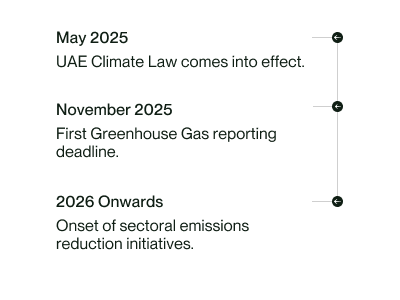
Table of Contents
Share this article
The UAE Climate Law—Federal Decree-Law No. 11 of 2024 on the Reduction of Climate Change Effects—represents a transformative step in the country’s sustainability agenda. With the UAE’s commitment to net zero emissions by 2050, the law mandates stringent greenhouse gas (GHG) reductions, promotes green innovation, and strengthens climate resilience across industries. This law introduces a comprehensive compliance framework requiring companies to align with sector-specific carbon neutrality goals.
Strategic Climate Goals
To align with 2015 Paris Agreement commitments, the UAE has set clear climate goals that require companies to adopt sustainable practices, reduce carbon footprints, and transition towards a low-carbon economy. This includes:
- Mandatory GHG reductions to curb emissions and meet sector-specific reduction targets.
- Innovation and green technology with an emphasis on climate-smart solutions and low-carbon infrastructure.
- Climate resilience measures to adopt early warning systems and risk mitigation strategies.
- Public-private sector collaboration to strengthen partnerships to accelerate the UAE’s energy transition.
Regulatory Requirements
To enforce climate action, the UAE has introduced a comprehensive regulatory framework that requires companies to undertake GHG monitoring, reporting, and mitigation through structured climate action plans and carbon trading initiatives, as highlighted below:
- Annual GHG Emission Reporting – Companies are required to report Scope 1 and Scope 2 emissions annually through the UAE Ministry of Climate Change and Environment (MOCCAE) centralised electronic platform.
- Companies with annual emissions ≥ 0.5 million metric tons CO₂e (Scope 1 & 2) must mandatorily register under the UAE National Carbon Registry, prepare GHG inventories aligned with ISO 14064 standard, and obtain third-party verification from MOCCAE approved verifiers.
- Companies with emissions < 0.5 million metric tons CO₂e may voluntarily register to participate in the UAE National Carbon Registry.
- To ensure compliance to annual GHG inventory reporting requirements, companies should maintain accurate data collection processes and integrate emissions tracking as part of their environmental disclosure and reporting systems. This will help MOCCAE to track progress towards national climate targets.
- Emission Reduction Strategies – Companies are encouraged to develop and submit a detailed climate action plan outlining emissions reduction in alignment with UAE Net Zero 2050. The action plan may include clear mitigation measures, investment in energy efficiency, adoption of low-carbon technologies, and integration of renewable energy sources.
- Carbon Credit Trading & Offsets – To support climate mitigation initiatives, the UAE has introduced the National Register for Carbon Credits, facilitating corporate participation in carbon trading and offsetting programs to compensate for residual emissions. Companies registered under the MOCCAE framework can purchase verified carbon credits from domestic or international climate projects aligned with leading industry practices. This mechanism will encourage companies to take a market-driven approach to decarbonisation, fostering sustainable investment in low-carbon technologies.
- Sector-Specific Emission Targets – Effective from 2026, the UAE will implement industry-specific emissions targets to drive measurable progress across key economic sectors (Oil and Gas, Petrochemicals, Energy and Utilities, Mining, Steel, Cement). The companies falling under these six sectors will be able to contribute to the sector-specific targets and eventually to the UAE Net Zero 2050 by registering their emissions with the UAE National Carbon Registry.
Impact on Organisations
As the UAE strengthens its climate policies, multinational corporations operating within the region – including those based in free zones – are encouraged to align with the UAE 2050 Net Zero Goals. Non-compliance with the regulatory requirements could result in fines up to 2 million AED.
Timeline
The UAE Climate Law will be implemented in a phased manner, allowing companies to adapt to new regulatory requirements. Some major milestones for the UAE Climate Law include:

Playbook for companies: how Anthesis can assist
As climate regulations in the UAE continue to evolve, companies must ensure compliance while leveraging decarbonisation and climate resilience as a strategic advantage. Anthesis offers streamlined solutions for integrating climate-conscious practices to mitigate risks and seize opportunities to pioneer low-carbon transition practices.
Anthesis can provide tailored solutions to enhance companies’ preparedness towards the UAE Climate Law, by providing advisory services in a structured manner as presented:
- Establish Internal Climate Governance: Assist in institutionalising climate-related governance by developing terms of reference for an internal committee to discuss internal climate agendas and compliance requirements.
- Climate Policy Measures: Assist in developing relevant policy measures for areas such as clean fuel policy / renewable energy integration policy / clean transport policy / circular economy policy, and others as relevant.
- Track & Report Emissions: Assist in undertaking GHG baseline assessments (Scope 1 and 2) and progressively incorporate Scope 3 emissions accounting by utilising the Anthesis RouteZero digital platform for enhanced tracking and reporting, and alignment with international standards such as GHG Protocol, ISO 14064, and CDP.
- Alignment with Sectoral Targets and UAE Net Zero: Assist in conducting Scope 1, 2 and 3 emissions alignment with sectoral targets as per UAE Net Zero 2050, including review and alignment with best practices and standards such as SBTi.
- Decarbonisation Roadmap: Assist in developing a detailed decarbonisation roadmap to include levers to reduce the emissions hotspots in Scope 1, 2 and 3. The roadmap may include projects and initiatives around energy-efficient design and equipment, demand-side management, green buildings, energy transition, renewable energy integration, renewable energy certificates, low-carbon mobility, including first and last mile, carbon capture solutions, and many more to reduce emissions.
- Climate Action Plan Development: Support in drafting and submitting UAE-compliant climate action plans with climate risk assessments, scenario modelling and financial impact assessment for climate-related risks.
- Engage in Carbon Markets: Participate in carbon credit trading to offset the residual emissions to meet the targets.
- Capacity Building: Undertake training and capacity building programmes for the key stakeholders and enhance the technical capacity of companies to implement decarbonisation actions.
The Competitive Edge
The UAE Climate Law is a momentous change for companies. Proactive compliance will mitigate risks and drive competitive advantage in a rapidly evolving regulatory landscape. By embedding climate-conscious decisions, strategic actions and innovations at the core of operations, companies can enhance stakeholder trust, increase in long-term sustainable operations, and contribute meaningfully to the UAE’s Net-Zero 2050 Strategy.
We are the world’s leading purpose driven, digitally enabled, science-based activator. And always welcome inquiries and partnerships to drive positive change together.



